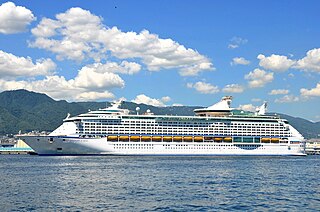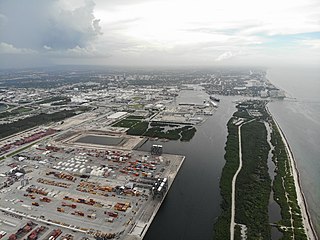
A port is a maritime facility comprising one or more wharves or loading areas, where ships load and discharge cargo and passengers. Although usually situated on a sea coast or estuary, ports can also be found far inland, such as Hamburg, Manchester and Duluth; these access the sea via rivers or canals. Because of their roles as ports of entry for immigrants as well as soldiers in wartime, many port cities have experienced dramatic multi-ethnic and multicultural changes throughout their histories.

Cruise ships are large passenger ships used mainly for vacationing. Unlike ocean liners, which are used for transport, cruise ships typically embark on round-trip voyages to various ports-of-call, where passengers may go on tours known as "shore excursions". On "cruises to nowhere" or "nowhere voyages", cruise ships make two- to three-night round trips without visiting any ports of call.

An ocean liner is a type of passenger ship primarily used for transportation across seas or oceans. Ocean liners may also carry cargo or mail, and may sometimes be used for other purposes. Only one ocean liner remains in service today.

A passenger ship is a merchant ship whose primary function is to carry passengers on the sea. The category does not include cargo vessels which have accommodations for limited numbers of passengers, such as the ubiquitous twelve-passenger freighters once common on the seas in which the transport of passengers is secondary to the carriage of freight. The type does however include many classes of ships designed to transport substantial numbers of passengers as well as freight. Indeed, until recently virtually all ocean liners were able to transport mail, package freight and express, and other cargo in addition to passenger luggage, and were equipped with cargo holds and derricks, kingposts, or other cargo-handling gear for that purpose. Only in more recent ocean liners and in virtually all cruise ships has this cargo capacity been eliminated.
Royal Caribbean International (RCI), also formerly known as Royal Caribbean Cruise Line (RCCL), is a cruise line brand founded in 1968 in Norway and organised as a wholly owned subsidiary of Royal Caribbean Group since 1997. Based in Miami, Florida. It is the largest cruise line by revenue and second largest by passengers counts. In 2018, Royal Caribbean International controlled 19.2% of the worldwide cruise market by passengers and 14.0% by revenue. It operates the five largest passenger ships in the world. As of January 2022, the line operates twenty-six ships and has four additional ships on order.

Port Everglades is a seaport in Fort Lauderdale, Florida, located in Broward County. Port Everglades is one of South Florida's foremost economic engines, as it is the gateway for both international trade and cruise vacations. In 2019, Port Everglades was ranked the third-busiest cruise homeport in the world, accommodating more than 3.89 million passengers. It was also one of the busiest container ports in Florida and ranked among the top 20 busiest in the United States, moving more than 1 million TEUs annually.

Marella Explorer is a Century-class cruise ship owned and operated by Marella Cruises. Before joining TUI she cruised as MV Galaxy with Celebrity Cruises, and later as Mein Schiff with TUI Cruises. She was laid down at the Meyer Werft shipyard in Papenburg, Germany, on 25 May 1995, was launched in May 1996, and was delivered to Celebrity Cruises on 10 October 1996. She entered service on 21 December 1996.
Economy class, also called third class, coach class, steerage, or to distinguish it from the slightly more expensive premium economy class, standard economy class or budget economy class, is the lowest travel class of seating in air travel, rail travel, and sometimes ferry or maritime travel. Historically, this travel class has been called tourist class or third class on ocean liners.

A passenger terminal is a structure in a port which services passengers boarding and leaving water vessels such as ferries, cruise ships and ocean liners. Depending on the types of vessels serviced by the terminal, it may be named ferry terminal, cruise terminal, marine terminal or maritime passenger terminal. As well as passengers, a passenger terminal sometimes has facilities for automobiles and other land vehicles to be picked up and dropped off by the water vessel.

MS Freedom of the Seas is a cruise ship operated by Royal Caribbean International. She is the namesake of Royal Caribbean's Freedom class, and can accommodate 3,634 passengers and 1,300 crew on fifteen passenger decks. The vessel also has 4 crew decks below the waterline. Freedom of the Seas was the largest passenger ship ever built from 2006 until construction of her sister ship, Liberty of the Seas in 2007.

Norwegian Star is a Dawn-class cruise ship operated by Norwegian Cruise Line (NCL). Ordered by and intended for Star Cruises, it was originally named SuperStar Libra before being transferred to NCL. Norwegian Star is a Panamax cruise ship; its 294-meter-length (965 ft) and 32.2-meter-beam (105.6 ft) nears the limit for ships transiting the Panama Canal through the original set of locks.

GTS Celebrity Millennium is a cruise ship operated by Celebrity Cruises. She is the lead ship of her namesake class, whose ships are powered by gas turbines. Delivered in 2000, she is the oldest operating ship in Celebrity's fleet.

Carnival Legend is a Spirit-class cruise ship operated by Carnival Cruise Line. Built by Kværner Masa-Yards at its Helsinki New Shipyard in Helsinki, Finland, she was floated out on December 17, 2001, and christened by English actress and author Dame Judi Dench in Harwich, Essex, UK, on August 21, 2002. Her maiden voyage, Carnival's first cruise in Europe, was a three-night journey from Harwich to Amsterdam and return.
EasyCruise was a cruise line of Greek ferry operator Hellenic Seaways. It was sold to them in August 2009 for £9 million by founder and Cypriot/British business man, Stelios Haji-Ioannou. They launched their first cruise ship EasyCruiseOne in 2005. Unlike other cruise lines, EasyCruise's business model offered passengers an inexpensive no-frills vacation with a la carte pricing for on board food and services. EasyCruise ended operations in early 2010.

Rhapsody of the Seas is a Vision-class cruise ship operated by Royal Caribbean International.

Liberty of the Seas is a Royal Caribbean International Freedom-class cruise ship which entered regular service in May 2007. It was initially announced that she would be called Endeavour of the Seas, however this name was later changed. The 15-deck ship accommodates 3,634 passengers served by 1,360 crew. She was built in 18 months at the Aker Finnyards Turku Shipyard, Finland, where her sister ship, Freedom of the Seas, was also built. Initially built at 154,407 gross tonnage (GT), she joined her sister ship, Freedom of the Seas, as the largest cruise ships and passenger vessels then ever built. She is 1,111.9 ft (338.91 m) long, 184 ft (56.08 m) wide, and cruises at 21.6 knots (40 km/h).

The Port of Galveston is the port of the city of Galveston, Texas. It was established by a proclamation issued by the Congress of Mexico on October 17, 1825, while the land known today as Texas was still part of Mexico. The Port of Galveston is the oldest port in the Gulf of Mexico west of New Orleans.
One-way travel or one way is a travel paid by a fare purchased for a trip on an aircraft, a train, a bus, or some other mode of travel without a return trip. One-way tickets may be purchased for a variety of reasons, such as if one is planning to permanently relocate to the destination, is uncertain of one's return plans, has alternate arrangements for the return, or if the traveler is planning to return, but there is no need to pay the fare in advance. For some modes of travel, often for buses, trams or metros, return tickets may not be available at all.

Norwegian Getaway is a cruise ship of the Norwegian Cruise Line. It was built by Meyer Werft in Papenburg, Germany, and was delivered to its owner on 10 January 2014. At the time of its christening it was the world's ninth-largest cruise ship with a passenger capacity of 3,969 and a crew of 1,640.
Mario Salcedo, nicknamed Super Mario, is an American businessman and a long-term passenger on cruise ships. He has continuously lived on Royal Caribbean International cruise ships since 2000, aside from about 15 days on land a year and a 15-month gap during the COVID-19 pandemic in 2020 and 2021.















